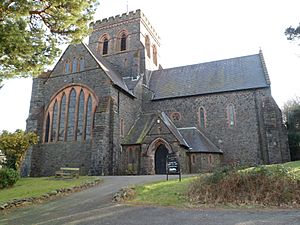St Padarn's Church, Llanberis facts for kids
Quick facts for kids St Padarn’s Church, Llanberis |
|
|---|---|
|
Eglwys Sant Padarn
|
|

St Padarn's Church
|
|
| OS grid reference | SH 577600 |
| Location | Llanberis, Gwynedd |
| Country | Wales |
| Denomination | Church in Wales |
| History | |
| Status | Parish church |
| Dedication | St Padarn |
| Dedicated | 24 June 1885 |
| Architecture | |
| Heritage designation | Grade II* listed building |
| Designated | 28 May 1999 |
| Architect(s) | Arthur Baker |
| Years built | 1884–1885 |
| Construction cost | £5,455 |
| Specifications | |
| Length | 120 feet (37 m) |
| Nave width | 25 feet (7.6 m) |
| Height | 37 feet (11 m) |
| Spire height | 96 feet (29 m) |
| Administration | |
| Parish | Bro Eryri |
| Deanery | Synod Bangor |
| Archdeaconry | Bangor |
| Diocese | Diocese of Bangor |
St Padarn's Church is a special church located in Llanberis, a town in Gwynedd, Wales. It's part of the Church in Wales, which is the official church in that country. This church is an important building in the community.
Contents
History of St Padarn's Church
Why a New Church Was Needed
Long ago, the first church for the area, called St Peris, was about 4 kilometers (2.5 miles) away from where Llanberis is now. As more people moved to Llanberis and the town grew bigger, they needed a new church closer to home.
Building the Church
The very first stone for the new church was placed on January 3, 1884. This important moment was led by Captain N.P. Stewart. The money to build the church came from the wealthy Assheton Smith family. They owned the rights to the slate quarried at nearby Dinorwig, which was a very big business.
The church was designed by an architect named Arthur Baker. He used local stone for the walls, which came from the area around Llanberis. For the decorative parts, he used red stone from quarries in Runcorn. The total cost to build this church was £5,455. This was a lot of money back in 1885!
Dedication and Expansion
The church was officially opened and dedicated on June 24, 1885. A special old stone font, which is a basin used for baptisms, was moved here from the original St Peris church.
Years later, in 1914, another architect named Harold Hughes made the church even bigger. He added a new section called the Lady Chapel on the north side of the church. He also finished the main part of the church, known as the nave.
The Parish of Bro Eryri
A "parish" is like a local church district. St Padarn's Church is part of a larger parish called Bro Eryri. This parish includes several other churches in the area.
- Christ Church, Deiniolen
- St Deiniol's Church, Llanddeiniolen
- St Helen's Church, Penisarwaun
- St Michael's Church, Llanrug
- St Peris's Church, Nant Peris
The Church Organ
St Padarn's Church has a pipe organ that was built in 1921. It was made by a company called J. W. Walker & Sons Ltd, which is famous for making church organs. This organ has two keyboards for playing with your hands and pedals for playing with your feet. It has 7 "stops," which are like different sets of pipes that make various sounds. You can find more details about this specific organ on the National Pipe Organ Register.
 | Aurelia Browder |
 | Nannie Helen Burroughs |
 | Michelle Alexander |

